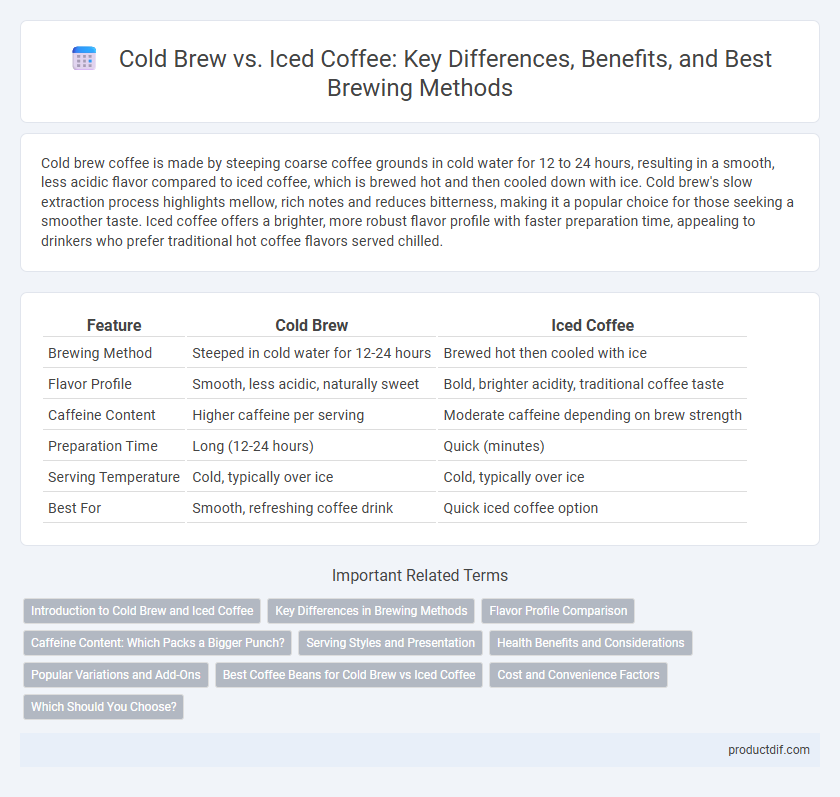Cold brew coffee is made by steeping coarse coffee grounds in cold water for 12 to 24 hours, resulting in a smooth, less acidic flavor compared to iced coffee, which is brewed hot and then cooled down with ice. Cold brew's slow extraction process highlights mellow, rich notes and reduces bitterness, making it a popular choice for those seeking a smoother taste. Iced coffee offers a brighter, more robust flavor profile with faster preparation time, appealing to drinkers who prefer traditional hot coffee flavors served chilled.
Table of Comparison
| Feature | Cold Brew | Iced Coffee |
|---|---|---|
| Brewing Method | Steeped in cold water for 12-24 hours | Brewed hot then cooled with ice |
| Flavor Profile | Smooth, less acidic, naturally sweet | Bold, brighter acidity, traditional coffee taste |
| Caffeine Content | Higher caffeine per serving | Moderate caffeine depending on brew strength |
| Preparation Time | Long (12-24 hours) | Quick (minutes) |
| Serving Temperature | Cold, typically over ice | Cold, typically over ice |
| Best For | Smooth, refreshing coffee drink | Quick iced coffee option |
Introduction to Cold Brew and Iced Coffee
Cold brew coffee is created by steeping coarsely ground coffee beans in cold water for 12 to 24 hours, resulting in a smooth, low-acidity beverage with concentrated flavors. Iced coffee is brewed hot using traditional drip or espresso methods, then rapidly cooled by pouring over ice, preserving the bold, bright flavors and higher acidity. The distinct brewing processes impact the caffeine content, taste profile, and texture, making cold brew creamier and less bitter compared to the sharper, more robust iced coffee.
Key Differences in Brewing Methods
Cold brew coffee involves steeping coarsely ground coffee beans in cold water for 12 to 24 hours, resulting in a smooth, less acidic flavor. Iced coffee is brewed hot using traditional methods, then rapidly cooled by pouring over ice, preserving more of the roast's brightness and acidity. The extended cold extraction in cold brew reduces bitterness, while iced coffee retains the quick extraction characteristics of hot brewing.
Flavor Profile Comparison
Cold brew coffee offers a smooth, mellow flavor with lower acidity, resulting from its slow steeping process in cold water over 12 to 24 hours. Iced coffee, brewed hot and rapidly chilled, retains a brighter, sharper taste with more pronounced acidity and bold coffee notes. The flavor profile of cold brew emphasizes subtle sweetness and chocolatey undertones, while iced coffee highlights fruity and citrusy nuances.
Caffeine Content: Which Packs a Bigger Punch?
Cold brew coffee typically contains higher caffeine levels than iced coffee due to its prolonged steeping process, which extracts more caffeine from the coffee grounds. On average, an 8-ounce serving of cold brew can have between 100 to 200 mg of caffeine, while iced coffee usually ranges from 70 to 120 mg per 8 ounces. The concentration and brewing method significantly impact the caffeine content, making cold brew a stronger choice for those seeking a bigger caffeine boost.
Serving Styles and Presentation
Cold brew coffee is steeped for 12 to 24 hours at room temperature or in the fridge, resulting in a smooth, concentrated flavor rarely diluted by ice, often served in minimalist glassware or mason jars to highlight its rich, dark hue. Iced coffee is brewed hot and quickly cooled, typically poured over ice cubes that can slightly water down the drink, served in tall glasses with visible ice to emphasize refreshment. Presentation styles often include garnishes like lemon slices or mint for iced coffee, whereas cold brew is frequently presented plain or with subtle cream swirls to showcase its velvety texture.
Health Benefits and Considerations
Cold brew coffee contains lower acidity levels than iced coffee, which reduces the risk of acid reflux and dental erosion. It often has a higher caffeine concentration, providing prolonged energy without the jittery spike commonly experienced with iced coffee. Both beverages offer antioxidants, but cold brew's slower extraction process preserves more chlorogenic acids that contribute to antioxidant benefits.
Popular Variations and Add-Ons
Cold brew features smooth, low-acidity profiles often enhanced with sweeteners like vanilla syrup or creamy additions such as oat milk and cold foam. Iced coffee offers more robust, sharper flavors typically complemented by classic options including milk, simple syrup, or flavored creamers like caramel and hazelnut. Both beverages support trendy add-ons such as nitro infusion for texture or spice blends like cinnamon for an aromatic boost.
Best Coffee Beans for Cold Brew vs Iced Coffee
Cold brew coffee benefits from coarsely ground, dark roast beans like Sumatra and Colombian varieties due to their rich, smooth flavors and low acidity. Iced coffee thrives with medium roast beans such as Ethiopian and Guatemalan, which preserve bright, fruity notes that balance well when chilled. Selecting beans with the right roast level and origin enhances the distinct taste profiles of cold brew and iced coffee.
Cost and Convenience Factors
Cold brew coffee often incurs higher costs due to longer steeping times and specialized equipment, while iced coffee benefits from faster preparation and lower expenses using regular brewed coffee. Cold brew offers convenience in batch preparation and longer fridge storage, reducing the need for daily brewing. Iced coffee provides immediate preparation flexibility, ideal for quick consumption and on-the-go situations.
Which Should You Choose?
Cold brew coffee offers a smoother, less acidic taste due to its long steeping process, making it ideal for those sensitive to bitterness, while iced coffee provides a brighter, more robust flavor achieved by brewing hot coffee and cooling it quickly. Cold brew contains higher caffeine concentration per serving, appealing to those seeking a stronger caffeine boost, whereas iced coffee typically has a slightly lower caffeine content depending on the brewing method and dilution. Choosing between cold brew and iced coffee depends on your preference for taste intensity, acidity level, and desired caffeine strength.
Cold Brew vs Iced Coffee Infographic

 productdif.com
productdif.com